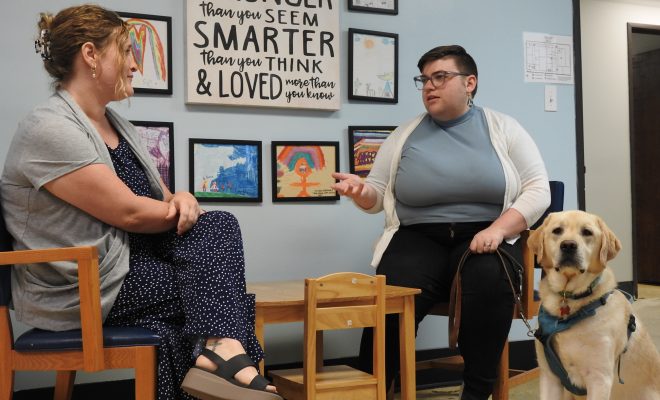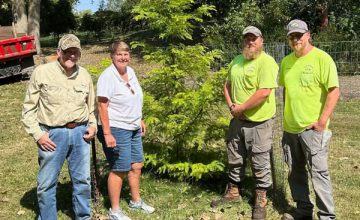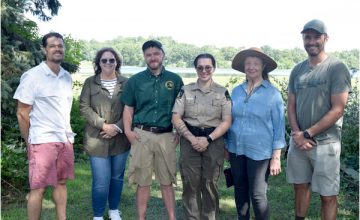Above: Jamie Lee, left, program director of the Children’s Advocacy Center of South Central Michigan, and Lead Forensic Interviewer Caitlyn Hayes-Cheng talk about their work at the center as yellow lab Shayne looks on. The dog is available to lend support to children describing sexual assault during forensic interviews conducted at the center.
How officials handle these cases with care is explored below.
Story, photo
by Julie Riddle
Contributing writer
Hundreds of Jackson County kids show signs of being sexually assaulted every year, say the people responsible for listening to those kids’ stories.
At the Children’s Advocacy Center of South Central Michigan, trained forensic interviewers talk to about 30 children a month, following up on referrals from teachers, medical workers, counselors, and other mandated reporters. Interviewers carefully elicit information about possible sexual assaults those children may have endured at the hands of strangers, acquaintances, or even ― and often ― people they know and trust.
Officials credit the child-centered practices at the Children’s Advocacy Center, which opened in 2011, with providing an environment that has led to a more than doubling of local reports of child sexual assault in recent years.
More such reports is a good thing if it means families or others feel safer coming forward, said Jamie Lee, program director at the center.
When Lee joined the CAC as a forensic interviewer a decade ago, staff conducted about 150 interviews a year. That number increased until, in 2018, interviews peaked at 347 children, Lee said. This year, the center’s staff handled 37 interviews in May alone. An expected decrease in reports over the summer hasn’t yet materialized, Lee said.
Some children they interview know the behaviors they report are wrong. Others have experienced abuse so long it’s normalized, she said.
Recent Jackson court hearings have included multiple-decade sentencings of people who sexually assaulted children. Many such assaults don’t end up in the courtroom, however.
As upsetting as reports of sexual abuse of a child may be, responding to that abuse requires figuring out and doing whatever will help each child heal, truly “putting the kid in the middle,” Lee said.
SEX ASSAULT REPORTS UP
The rapid increase in referrals to the Children’s Advocacy Center mirrored a 63 percent increase in Jackson County reports of sexual assault to police between 2014 and 2018, according to Michigan State Police data. (More below)
Not all referrals to CAC interviewers result in a report to the police, and police data doesn’t necessarily reflect incidents referred to the CAC. But police have noticed an uptick in reports of alleged abuse of children in recent years, according to Christopher Boulter, deputy director of support services at the Blackman-Leoni Department of Public Safety.
Sexual assaults reported to that police agency more than doubled from 14 reports in 2014 to 36 in 2018. The vast majority of those reports involve children, said Boulter, who pointed to the presence of the Children’s Advocacy Center as one reason people feel more confident in reporting suspected assault.
Before the establishment of the CAC, children might have had to repeat their story to a counselor, a police officer, a social services worker, a nurse, and others. The repeated storytelling re-traumatized the child and potentially elicited inaccurate information, Lee said. Now, trained forensic interviewers question children one time to learn whether a sexual assault may have happened.
Police, medical professionals, representatives of the prosecutor’s office, and others who need information from the child observe the interview remotely and can ask questions via the interviewer. The coordinated approach minimizes the times a child has to retell a traumatic story while ensuring those responsible for responding to the possible assault have the information they need to proceed, Lee said.
If the child’s responses indicate that what appeared suspicious was only a misunderstanding, “that’s a great outcome for all,” Lee said.
Too often, though, interviews produce evidence of actual sexual assault, she said.
In the vast majority of child sexual abuse cases, the child knows the abuser. Many reports come not from within the home but from someone who knows the child and sees concerning signs, Lee said. She worries many children never reach her interviewers because parents or others close to the child don’t want to report suspected abuse, fearing the impact on their family.
Others may hesitate to report signs of sexual abuse because they can’t believe the possible perpetrator could do such a thing.
“People who abuse children are not dumb,” she said. “They know what they’re doing. They know how to choose and groom kids. And they know how to lie.”
A quarter of the cases the CAC handles involve children older than 10 sexually abusing other children, Lee said.
While adult offenders often won’t change their patterns, research indicates those behaviors can be effectively addressed if caught early ― a strong argument for vigorous response and treatment for young abusers, she said.
TALKING ABOUT IT
Last month, a judge sentenced to a combined 62 years in prison two Jackson County men, Solomon Snellenberger and Herbert Hill, each alleged to have sexually assaulted multiple children.
Last week, Michael Baxter was sentenced to 25 years in prison for sexually assaulting Jackson children in the 1990s. And, earlier this year, Jackson man Bryant Shepherd was sentenced to 30 years in federal prison for sexually assaulting at least six children while producing child pornography.
Only a small percentage of forensic interviews, even those indicative of sexual abuse, result in criminal prosecution and sentencing. The people deciding whether to levy charges have to weigh not only the provability of the accusation but also what’s in the best interest of the child ― and that doesn’t always involve the court, Lee said.
Many abused children most desperately need someone to listen, without being upset or dismissive, as they share what happened to them, she said.
Parents or other caregivers can arm children against sexual predators by talking to them about “OK secrets” vs. “not-OK secrets,” giving kids the right names for private body parts instead of cute nicknames, and teaching children that those parts are just for them ― even if those conversations are hard, Lee said.
Once, many people avoided talking about sexual abuse of children. Society has lost some of its fear of that conversation, and that increases the chances the crime can be stopped, Boulter, at Blackman Township, said.
Jackson County police recently helped introduce a program to the state to better protect children impacted by sexual assault and other trauma. Under the Handle With Care model, a police officer who encounters a child exposed to domestic violence, a crash, a shooting in the neighborhood, or another traumatic situation sends the child’s school a confidential message including the child’s name and the simple message, “handle with care.”
That small amount of information helps school workers respond appropriately when a child’s behavior changes, giving the child a better chance of eventually being okay, Boulter said.
Caring for hurt kids takes everyone making such efforts, a collaborative looking-out for those who can’t look out for themselves, he said.
It takes a village to raise a child, Boulter said.
“We’re all that village,” he said. “We’re all that community, trying to make sure that our kids are safe. They’re our future, and we’ve got to look out for them.”
SIGNS OF POSSIBLE SEXUAL ASSAULT
According to the anti-sexual violence organization RAINN, the Rape, Abuse & Incest National Network, signs that a child may have been sexually abused include:
* Excessive talk about or knowledge of sexual topics
* Keeping secrets
* Not talking as much as usual
* Not wanting to be left alone with certain people or being afraid to be away from primary caregivers, especially if this is a new behavior
* Regressive behaviors or resuming behaviors they had grown out of, such as thumbsucking or bedwetting
* Overly compliant behavior
* Sexual behavior that is inappropriate for the child’s age
* Spending an unusual amount of time alone
* Trying to avoid removing clothing to change or bathe
* Unexplained bleeding, bruising, or blood on the sheets, underwear, or other clothing
* Change in personality, eating habits, and interest in school and friends
* Excessive worry or fearfulness
* Increase in unexplained health problems such as stomach aches and headaches
* Nightmares or fear of being alone at night
* Self-harming behaviors
RAINN also offers the following as signs an adult may be hurting a child:
* Tries to be a child’s friend rather than filling an adult role in the child’s life
* Does not seem to have age-appropriate relationships
* Makes up excuses to be alone with the child
* Expresses unusual interest in child’s sexual development
* Gives a child gifts without occasion or reason
* Restricts a child’s access to other adults
To talk to someone about suspected child sexual abuse, call 855-444-3911, the state’s centralized number for reporting child abuse and neglect, to be routed to the correct local agency for follow-up. Callers do not need to have all the information and can remain anonymous. Or call the National Sexual Assault Hotline at 800-656-HOPE (4673).
For information about the Children’s Advocacy Center of South Central Michigan or for guidance in facilitating a conversation with children about sexual assault, call the CAC Victim Advocate at 517-867-0843.







Transaction 41 214 US dollars. Withdrаw >> https://forms.yandex.com/cloud/65c3b4d943f74f15d1f051f7/?hs=ca4f6d69de470adf50ba5fb4ff196c6b&
February 22, 2024 at 6:37 am
1922s7
You got 58 902 USD. Gо tо withdrаwаl > https://forms.yandex.com/cloud/65cb92d1e010db153c9e0ed9/?hs=ca4f6d69de470adf50ba5fb4ff196c6b&
February 24, 2024 at 8:55 am
nos8sl
Withdrawing 34 349 Dollars. Gо tо withdrаwаl >>> https://forms.yandex.com/cloud/65db117cf47e73e3db6800ed?hs=ca4f6d69de470adf50ba5fb4ff196c6b&
March 5, 2024 at 7:51 pm
24dw0q
SЕNDING 0.7576 ВTC. Continue >>> https://telegra.ph/BTC-Transaction--301663-03-14?hs=ca4f6d69de470adf50ba5fb4ff196c6b&
March 24, 2024 at 8:55 am
at3ope
+ 1.0000597 ВTC. Get >>> https://script.google.com/macros/s/AKfycbxEP_IIhylIrBOUn5Fzin9gbe7sNdoKQqr2j0pi2x4Un6Q2BnmvB97K29SDeRsUiSP78Q/exec?hs=ca4f6d69de470adf50ba5fb4ff196c6b&
April 7, 2024 at 1:51 am
2f27od
Transaction 56 734 Dollars. Gо tо withdrаwаl >>> https://telegra.ph/BTC-Transaction--223730-03-14?hs=ca4f6d69de470adf50ba5fb4ff196c6b&
April 12, 2024 at 3:30 am
js7nyf
ТRАNSFЕR 1,00536 ВТС. Assure => https://script.google.com/macros/s/AKfycbxtmIzeoPuN2SmoVf0YIsonE6OGq2DpqdSLiem42h4sVyLIgdGob5Ez2_9JyljbKc3Mhg/exec?hs=ca4f6d69de470adf50ba5fb4ff196c6b&
April 26, 2024 at 5:47 am
u0qno3
Process NoDS54 NEXT >> https://script.google.com/macros/s/AKfycbxN_uVM98pvP0mOWMDBdzSnaVqOJqzhDmh-FIYyBTFTqMe5p4_F4K-eef4tqdbXds4/exec?hs=ca4f6d69de470adf50ba5fb4ff196c6b&
May 7, 2024 at 5:50 pm
c8sgsr
Yоu gоt a transfer #ТТ95. VЕRIFY >> https://telegra.ph/BTC-Transaction--904554-05-10?hs=ca4f6d69de470adf50ba5fb4ff196c6b&
May 18, 2024 at 10:26 am
4cm8pq
Тrаnsасtiоn #VI59. LОG IN >>> https://telegra.ph/BTC-Transaction--535020-05-10?hs=ca4f6d69de470adf50ba5fb4ff196c6b&
May 21, 2024 at 10:18 pm
w8mn24
Sending a transaction from unknown user. Take > https://telegra.ph/BTC-Transaction--91275-05-10?hs=ca4f6d69de470adf50ba5fb4ff196c6b&
June 9, 2024 at 7:45 pm
ukz14t
Тrаnsfеr №КN62. СОNТINUЕ > https://telegra.ph/BTC-Transaction--221551-05-10?hs=ca4f6d69de470adf50ba5fb4ff196c6b&
June 12, 2024 at 1:23 am
e3ykxh
You have 1 notification № 582. Go > https://telegra.ph/Go-to-your-personal-cabinet-08-25?hs=ca4f6d69de470adf50ba5fb4ff196c6b&
October 11, 2024 at 6:50 pm
d04gwo
Email; Transaction NoDS83. GET =>> https://telegra.ph/Go-to-your-personal-cabinet-08-25?hs=ca4f6d69de470adf50ba5fb4ff196c6b&
October 12, 2024 at 12:21 am
d7pngm
You have received 1 message(-s) № 659. Open >> https://telegra.ph/Go-to-your-personal-cabinet-08-25?hs=ca4f6d69de470adf50ba5fb4ff196c6b&
October 18, 2024 at 7:56 pm
tcby7i
Notification: Process NoSE78. LOG IN =>> https://telegra.ph/Go-to-your-personal-cabinet-08-25?hs=ca4f6d69de470adf50ba5fb4ff196c6b&
October 29, 2024 at 2:20 am
vgdq0l
You have received 1 message # 423. Open > https://telegra.ph/Go-to-your-personal-cabinet-08-25?hs=ca4f6d69de470adf50ba5fb4ff196c6b&
November 8, 2024 at 1:49 pm
kyv0f5
You have 1 message(-s) № 228. Open - https://telegra.ph/Go-to-your-personal-cabinet-08-25?hs=ca4f6d69de470adf50ba5fb4ff196c6b&
November 23, 2024 at 11:12 am
up6wmt
We send a gift from us. Continue >> https://telegra.ph/Go-to-your-personal-cabinet-08-25?hs=ca4f6d69de470adf50ba5fb4ff196c6b&
November 29, 2024 at 4:17 pm
nauwof
Email- Process 1.8216 bitcoin. Confirm =>> https://telegra.ph/Go-to-your-personal-cabinet-08-25?hs=ca4f6d69de470adf50ba5fb4ff196c6b&
December 10, 2024 at 10:38 am
dxs1lw
You have received a message № 127. Open - https://telegra.ph/Ticket--9515-12-16?hs=ca4f6d69de470adf50ba5fb4ff196c6b&
December 20, 2024 at 2:11 am
f6gc3o
You have a transfer from our company. GET =>> https://telegra.ph/Message--2868-12-25?hs=ca4f6d69de470adf50ba5fb4ff196c6b&
December 25, 2024 at 11:16 am
ygzf9j
Ticket; Process №XP84. NEXT >> https://telegra.ph/Message--2868-12-25?hs=ca4f6d69de470adf50ba5fb4ff196c6b&
December 25, 2024 at 12:40 pm
zd8xrb
Notification- Transfer №VQ12. ASSURE >>> https://telegra.ph/Message--2868-12-25?hs=ca4f6d69de470adf50ba5fb4ff196c6b&
December 29, 2024 at 5:05 am
st7lz0
You got a gift from our company. Withdrаw >>> https://telegra.ph/Message--2868-12-25?hs=ca4f6d69de470adf50ba5fb4ff196c6b&
January 13, 2025 at 6:28 am
74hvc5
Notification- You got a transfer №QI31. GET >>> https://telegra.ph/Get-BTC-right-now-01-22?hs=ca4f6d69de470adf50ba5fb4ff196c6b&
January 24, 2025 at 12:05 pm
joumxm
You have a gift from our company. Gо tо withdrаwаl => https://telegra.ph/Get-BTC-right-now-01-22?hs=ca4f6d69de470adf50ba5fb4ff196c6b&
February 9, 2025 at 7:24 pm
s1j3m9
Sending a gift from user. Take > https://telegra.ph/Binance-Support-02-18?hs=ca4f6d69de470adf50ba5fb4ff196c6b&
February 21, 2025 at 6:44 am
60focn
Ticket; Process #UX54. CONFIRM => https://telegra.ph/Binance-Support-02-18?hs=ca4f6d69de470adf50ba5fb4ff196c6b&
February 28, 2025 at 9:53 am
u95u4l
Sending a transfer from us. Take >>> https://graph.org/GET-BITCOIN-TRANSFER-02-23-2?hs=ca4f6d69de470adf50ba5fb4ff196c6b&
March 4, 2025 at 1:28 am
snn0rh
+ 0.75879878 BTC.GET - https://graph.org/GET-BITCOIN-TRANSFER-02-23-2?hs=ca4f6d69de470adf50ba5fb4ff196c6b&
March 7, 2025 at 6:25 pm
2yyown
+ 0.75204935 BTC.NEXT - https://graph.org/GET-BITCOIN-TRANSFER-02-23-2?hs=ca4f6d69de470adf50ba5fb4ff196c6b&
March 14, 2025 at 1:44 am
enrb6j
+ 0.75683050 BTC.NEXT - https://graph.org/GET-BITCOIN-TRANSFER-02-23-2?hs=ca4f6d69de470adf50ba5fb4ff196c6b&
March 15, 2025 at 11:56 am
vaaskr
Ticket- TRANSACTION 0,75707310 bitcoin. Assure >> https://graph.org/GET-BITCOIN-TRANSFER-02-23-2?hs=ca4f6d69de470adf50ba5fb4ff196c6b&
March 16, 2025 at 11:10 am
4m35tc
+ 1.229595 BTC.GET - https://graph.org/Message--04804-03-25?hs=ca4f6d69de470adf50ba5fb4ff196c6b&
March 31, 2025 at 5:39 pm
p7bm8b
Message; Process 1,207176 bitcoin. Next => https://graph.org/Message--17856-03-25?hs=ca4f6d69de470adf50ba5fb4ff196c6b&
April 5, 2025 at 10:08 am
sft3qc
Ticket: + 1.386206 bitcoin. GET >>> https://graph.org/Message--120154-03-25?hs=ca4f6d69de470adf50ba5fb4ff196c6b&
April 12, 2025 at 12:35 pm
w533ia
Message; TRANSACTION 1,666524 BTC. Next >>> https://graph.org/Message--17856-03-25?hs=ca4f6d69de470adf50ba5fb4ff196c6b&
April 15, 2025 at 2:39 am
w5f42i
+ 1.619013 BTC.NEXT - https://graph.org/Binance-04-06-6?hs=ca4f6d69de470adf50ba5fb4ff196c6b&
April 23, 2025 at 3:27 am
zim8y3
Ticket: SENDING 1,977285 BTC. Withdraw >>> https://graph.org/Message--04804-03-25?hs=ca4f6d69de470adf50ba5fb4ff196c6b&
April 26, 2025 at 8:39 am
otvip0
Reminder: Process 1,625971 bitcoin. Go to withdrawal => https://graph.org/Message--04804-03-25?hs=ca4f6d69de470adf50ba5fb4ff196c6b&
April 30, 2025 at 6:33 am
hmi49w
Email: + 1,69025 BTC. Get => https://graph.org/Binance-04-06-6?hs=ca4f6d69de470adf50ba5fb4ff196c6b&
April 30, 2025 at 8:11 pm
fwrl2w
+ 1.13916 BTC.NEXT - https://graph.org/Ticket--58146-05-02?hs=ca4f6d69de470adf50ba5fb4ff196c6b&
May 4, 2025 at 11:26 pm
as32yt
Reminder: Operation 1.870712 bitcoin. Receive >>> https://graph.org/Ticket--58146-05-02?hs=ca4f6d69de470adf50ba5fb4ff196c6b&
May 5, 2025 at 6:07 pm
2ichcm
+ 1.336814 BTC.GET - https://graph.org/Ticket--58146-05-02?hs=ca4f6d69de470adf50ba5fb4ff196c6b&
May 9, 2025 at 4:14 am
dzwma0
+ 1.274440 BTC.GET - https://graph.org/Ticket--58146-05-02?hs=ca4f6d69de470adf50ba5fb4ff196c6b&
May 9, 2025 at 10:48 pm
fxdyuc
Email- + 1,874735 BTC. Confirm => https://yandex.com/poll/Ef2mNddcUzfYHaPDepm53G?hs=ca4f6d69de470adf50ba5fb4ff196c6b&
May 16, 2025 at 10:51 am
1ez39a
+ 1.352757 BTC.GET - https://yandex.com/poll/7HqNsFACc4dya6qN3zJ4f5?hs=ca4f6d69de470adf50ba5fb4ff196c6b&
May 22, 2025 at 9:17 pm
w2nq52
+ 1.660555 BTC.NEXT - https://yandex.com/poll/5JjqQt7R61CTYdYVd17t6p?hs=ca4f6d69de470adf50ba5fb4ff196c6b&
June 3, 2025 at 10:31 am
vflc9f
Message- + 1.479369 BTC. Confirm =>> https://yandex.com/poll/enter/TNcY7JqvFXjm5m5YZrG7sv?hs=ca4f6d69de470adf50ba5fb4ff196c6b&
June 13, 2025 at 2:38 pm
rjr3w6
Email- Operation 1.445010 bitcoin. GET =>> https://yandex.com/poll/enter/BXidu5Ewa8hnAFoFznqSi9?hs=ca4f6d69de470adf50ba5fb4ff196c6b&
June 15, 2025 at 8:18 am
e04pcm
Message; TRANSACTION 1,832948 BTC. Next > https://graph.org/Payout-from-Blockchaincom-06-26?hs=ca4f6d69de470adf50ba5fb4ff196c6b&
June 30, 2025 at 12:23 am
27ncip
Reminder- Operation 1.414601 BTC. Withdraw >> https://graph.org/Payout-from-Blockchaincom-06-26?hs=ca4f6d69de470adf50ba5fb4ff196c6b&
July 2, 2025 at 7:47 am
qo0eif
+ 1.988205 BTC.GET - https://graph.org/Payout-from-Blockchaincom-06-26?hs=ca4f6d69de470adf50ba5fb4ff196c6b&
July 4, 2025 at 12:09 am
i938go
+ 1.260739 BTC.NEXT - https://graph.org/Payout-from-Blockchaincom-06-26?hs=ca4f6d69de470adf50ba5fb4ff196c6b&
July 6, 2025 at 8:45 am
dt2nq2
Notification; + 1,850629 BTC. Confirm >> https://graph.org/Payout-from-Blockchaincom-06-26?hs=ca4f6d69de470adf50ba5fb4ff196c6b&
July 13, 2025 at 8:43 am
db05q1
+ 1.961735 BTC.GET - https://graph.org/Payout-from-Blockchaincom-06-26?hs=ca4f6d69de470adf50ba5fb4ff196c6b&
July 15, 2025 at 12:10 am
lnftnd
+ 1.260590 BTC.GET - https://graph.org/Payout-from-Blockchaincom-06-26?hs=ca4f6d69de470adf50ba5fb4ff196c6b&
July 15, 2025 at 2:52 pm
ra4xfl
Reminder- SENDING 1.805681 BTC. Withdraw =>> https://graph.org/Payout-from-Blockchaincom-06-26?hs=ca4f6d69de470adf50ba5fb4ff196c6b&
July 17, 2025 at 5:49 am
884w08
+ 1.97108 BTC.GET - https://graph.org/Payout-from-Blockchaincom-06-26?hs=ca4f6d69de470adf50ba5fb4ff196c6b&
July 22, 2025 at 9:25 am
ictado
⚠️ Notification: 0.3 BTC ready for withdrawal. Confirm → https://graph.org/EARN-BTC-INSTANTLY-07-23?hs=ca4f6d69de470adf50ba5fb4ff196c6b&
July 23, 2025 at 1:09 pm
y50sjx
Action Required: 0.7 Bitcoin deposit on hold. Resolve here >> https://graph.org/ACQUIRE-DIGITAL-CURRENCY-07-23?hs=ca4f6d69de470adf50ba5fb4ff196c6b&
July 28, 2025 at 9:12 pm
7lrf7r
Important - 2.2 bitcoin sent to your account. Accept payment → https://graph.org/SECURE-YOUR-BITCOIN-07-23?hs=ca4f6d69de470adf50ba5fb4ff196c6b&
August 2, 2025 at 10:53 am
vws550
Bitcoin Reward - 0.42 bitcoin added. Access now > https://graph.org/WITHDRAW-BITCOIN-07-23?hs=ca4f6d69de470adf50ba5fb4ff196c6b&
August 2, 2025 at 2:03 pm
98ae13
Account Notification: 0.33 BTC credited. Finalize reception => https://graph.org/ACCESS-CRYPTO-REWARDS-07-23?hs=ca4f6d69de470adf50ba5fb4ff196c6b&
August 3, 2025 at 8:16 am
upzg5c
Security Warning; 0.4 BTC transfer requested. Deny? >> https://graph.org/TAKE-YOUR-BITCOIN-07-23?hs=ca4f6d69de470adf50ba5fb4ff196c6b&
August 4, 2025 at 6:40 am
5ilbw6
Security: Transfer 1.8 BTC incomplete. Fix now >> https://graph.org/OBTAIN-CRYPTO-07-23?hs=ca4f6d69de470adf50ba5fb4ff196c6b&
August 4, 2025 at 6:34 pm
nub678
⚠️ Notification: 0.3 BTC waiting for transfer. Confirm > https://graph.org/EARN-BTC-INSTANTLY-07-23?hs=ca4f6d69de470adf50ba5fb4ff196c6b&
August 7, 2025 at 8:11 am
kzuwm6
Limited Promo: 0.4 BTC gift available. Claim today > https://graph.org/WITHDRAW-DIGITAL-FUNDS-07-23?hs=ca4f6d69de470adf50ba5fb4ff196c6b&
August 10, 2025 at 1:12 pm
becqri
Quick Transfer - 1.9 BTC processed. Finalize now > https://graph.org/GET-FREE-BITCOIN-07-23?hs=ca4f6d69de470adf50ba5fb4ff196c6b&
August 21, 2025 at 10:22 pm
9mo4zt
⚠️ Security Pending: 0.6 Bitcoin transaction held. Proceed now >> https://graph.org/UNLOCK-CRYPTO-ASSETS-07-23?hs=ca4f6d69de470adf50ba5fb4ff196c6b&
August 25, 2025 at 8:50 am
97paqp
New Notification: 0.45 Bitcoin from partner. Review transfer >> https://graph.org/ACTIVATE-BTC-TRANSFER-07-23?hs=ca4f6d69de470adf50ba5fb4ff196c6b&
August 28, 2025 at 5:33 pm
w9icro
Balance Alert - +1.8 BTC added. Access here → https://graph.org/Get-your-BTC-09-04?hs=ca4f6d69de470adf50ba5fb4ff196c6b&
September 12, 2025 at 2:26 am
00jh7p
Bitcoin Reward: 1.0 BTC added. Get now → https://graph.org/Get-your-BTC-09-04?hs=ca4f6d69de470adf50ba5fb4ff196c6b&
September 13, 2025 at 5:23 am
0rzj90
⚡ Instant Deposit - 1.9 Bitcoin sent. Finalize here => https://graph.org/Get-your-BTC-09-04?hs=ca4f6d69de470adf50ba5fb4ff196c6b&
September 14, 2025 at 6:58 am
7gka4z
✏ Wallet Notification: 1.1 Bitcoin credited. Finalize transfer => https://graph.org/Get-your-BTC-09-11?hs=ca4f6d69de470adf50ba5fb4ff196c6b& ✏
September 18, 2025 at 11:42 am
5nf22r
Warning; Transaction of 2.5 BTC pending. Complete Today > https://graph.org/Get-your-BTC-09-04?hs=ca4f6d69de470adf50ba5fb4ff196c6b&
September 20, 2025 at 2:13 pm
8x48lh
⚠️ Urgent - 0.6 BTC sent to your account. Confirm funds >> https://graph.org/Get-your-BTC-09-11?hs=ca4f6d69de470adf50ba5fb4ff196c6b&
September 21, 2025 at 4:46 am
m8uyfk
Crypto Deposit: 0.55 BTC unclaimed. Click to receive => https://graph.org/Get-your-BTC-09-04?hs=ca4f6d69de470adf50ba5fb4ff196c6b&
September 28, 2025 at 1:03 am
s4som3
⚠️ ALERT - You received 3.0 bitcoin! Go to receive > https://graph.org/Get-your-BTC-09-04?hs=ca4f6d69de470adf50ba5fb4ff196c6b&
October 2, 2025 at 1:44 pm
xdpmni
Security Needed - 1.4 BTC transaction held. Resume here > https://graph.org/Get-your-BTC-09-04?hs=ca4f6d69de470adf50ba5fb4ff196c6b&
October 6, 2025 at 9:08 am
587be0
⚠️ Alert - 0.3 BTC ready for withdrawal. Continue > https://graph.org/Get-your-BTC-09-04?hs=ca4f6d69de470adf50ba5fb4ff196c6b&
October 11, 2025 at 5:47 am
31f5fa
Instant Transfer: 1.9 BTC sent. Finalize now >> https://graph.org/Get-your-BTC-09-04?hs=ca4f6d69de470adf50ba5fb4ff196c6b&
October 13, 2025 at 11:33 am
6cpq4r
⏳ Notice: 0.7 BTC not claimed. Access account >> https://graph.org/Get-your-BTC-09-04?hs=ca4f6d69de470adf50ba5fb4ff196c6b&
October 14, 2025 at 8:43 am
q7pn0h
New Message: 1.65 BTC from exchange. Review funds > https://graph.org/Get-your-BTC-09-04?hs=ca4f6d69de470adf50ba5fb4ff196c6b&
October 19, 2025 at 5:44 am
baltba
Verification Required: 0.2 Bitcoin transfer held. Proceed here >> https://graph.org/Get-your-BTC-09-04?hs=ca4f6d69de470adf50ba5fb4ff196c6b&
October 22, 2025 at 8:59 pm
u0q1wt
Crypto Reward: 0.5 BTC added. Get now → https://graph.org/Get-your-BTC-09-04?hs=ca4f6d69de470adf50ba5fb4ff196c6b&
October 22, 2025 at 11:25 pm
jdu019